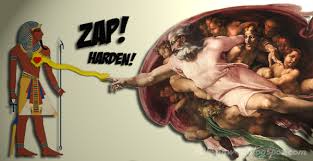 In Romans 9, Paul writes about the hardening of Pharaoh’s heart for the purposes of making God’s glory known. This seems rather harsh to some.
In Romans 9, Paul writes about the hardening of Pharaoh’s heart for the purposes of making God’s glory known. This seems rather harsh to some.
What does Paul mean?
Who Hardened Pharaoh’s Heart First?
In this debate, Calvinists say that God hardened Pharaoh’s heart first from eternity past because God needed a vessel of destruction through whom to reveal His wrath. They say that the text is quite clear in teaching that God hardened Pharaoh’s heart (Exod 9:12; 10:1, 20, 27; 11:10; 14:4, 8).
Non-Calvinists respond that in the Exodus account, the text frequently states that Pharaoh hardened his own heart before God hardened it (Exod 8:15, 32; 9:34). There are also several references which state that Pharaoh’s heart was hardened without giving indication about the source of this hardening (Exod 7:13, 14, 22; 8:19; 9:7, 35).
 But in response to this, Calvinists argue back that although the text says that Pharaoh hardened his own heart before God hardened it, before Moses even went to speak to Pharaoh, God told Him that He planned to harden Pharaoh’s heart (Exod 4:21; 7:3).
But in response to this, Calvinists argue back that although the text says that Pharaoh hardened his own heart before God hardened it, before Moses even went to speak to Pharaoh, God told Him that He planned to harden Pharaoh’s heart (Exod 4:21; 7:3).
As one is reading all the exegetical and theological arguments surrounding this debate about who hardened Pharaoh’s heart first, it begins to sound a bit like the question of which came first: the chicken or the egg.
It Doesn’t Matter Who Hardened Pharaoh’s Heart First!
Rather than summarizing all the exegetical and theological arguments on both sides of this debate, it seems best to avoid all the rhetoric and cut through to the main question which neither side seems to be asking.
The real question is this: “What does it mean for Pharaoh’s heart to be hardened?”
 The issue is not about who hardened Pharaoh’s heart first—though that is where most of the ink has been spilled—but rather about what it means for Pharaoh’s heart to be hardened.
The issue is not about who hardened Pharaoh’s heart first—though that is where most of the ink has been spilled—but rather about what it means for Pharaoh’s heart to be hardened.
People on both sides of the debate often assume that the hardening of Pharaoh’s heart means that Pharaoh was solidified in his status as an unregenerate person headed for hell.
But what if the hardening of Pharaoh’s heart doesn’t mean this at all? What if it simply refers instead to the resolve in Pharaoh’s heart to keep the Israelites as his slaves, and has absolutely nothing whatsoever to do with Pharaoh’s eternal destiny?
What if God, in His desire to make His glory known to both the Israelites and the Egyptians, made certain that Pharaoh would resist the will of God to deliver the people of Israel from Egypt, so that all those who witnessed and heard of these events would know that the God of Israel alone was God?
Could not God, in His gracious sovereignty, harden Pharaoh’s heart without affecting whatsoever Pharaoh’s ability to believe in God’s promises and thus become part of God’s redeemed people?
Of course He could!
Dr. J. Sidlow Baxter makes a similar point:
The awesome words to Pharaoh can be faced in their full force—“Even for this same purpose have I raised thee up, that I might show My power in thee, and that My name might be declared throughout all the earth.” The words “raised thee up” do not mean that God had raised him up from birth for this purpose: they refer to his elevation to the highest throne on earth. Nay, as they occur in Exodus 9:16, they scarce mean even that, but only that God had kept Pharaoh from dying in the preceding plague, so as to be made the more fully an object lesson to all men. Moreover, when Paul (still alluding to Pharaoh) says, “And whom He will, He hardeneth” (Exod 9:18), we need not try to soften the word.
God did not override Pharaoh’s own will. The hardening was a reciprocal process. Eighteen times we are told that Pharaoh’s heart was “hardened” in refusal. In about half of these the hardening is attributed to Pharaoh himself; in the others to God. But the whole contest between God and Pharaoh must be interpreted by what God said to Moses before ever the contest started: “The king of Egypt will not” (Exod 3:19). The will was already set. The heart was already hard. The hardening process developed inasmuch as the plagues forced Pharaoh to an issue which crystallized his sin. … Pharaoh’s eternal destiny is not the thing in question (Baxter, Explore the Book, VI:88-89).
This means that the hardening of Pharaoh’s heart, whether it is done by God or Pharaoh, or by some symbiotic combination of the two, has absolutely nothing to do with Pharaoh’s eternal destiny.
Even if the Exodus account laid all the responsibility for the hardening of Pharaoh’s heart upon God Himself, and none upon Pharaoh, this still would tell us nothing about whether or not Pharaoh concluded His life as one of God’s redeemed.
 Pharaoh’s eternal destiny is not under discussion in Exodus or in Romans, and so Pharaoh’s heart can be hardened so that God’s purposes are achieved, while still leaving plenty of room for Pharaoh to believe in God’s promises and become one of God’s people.
Pharaoh’s eternal destiny is not under discussion in Exodus or in Romans, and so Pharaoh’s heart can be hardened so that God’s purposes are achieved, while still leaving plenty of room for Pharaoh to believe in God’s promises and become one of God’s people.
If you want a longer and more detailed explanation of why God hardened Pharaoh’s heart, check out my new book: The Re-Justification of God.
If you want to read more about Calvinism, check out other posts in this blog series: Words of Calvinism and the Word of God.

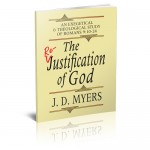

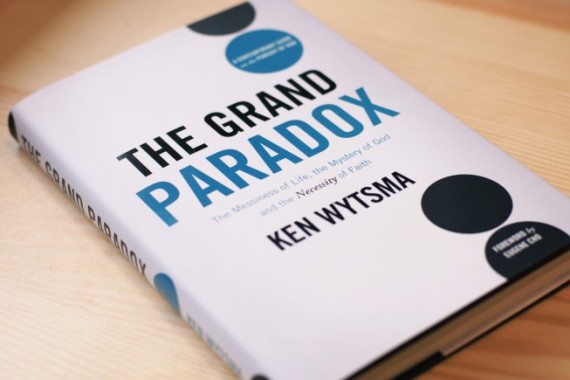
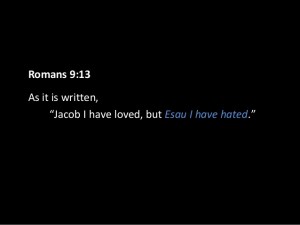 Paul writes a difficult statement in Romans 9:13:
Paul writes a difficult statement in Romans 9:13:
 How can we choose between the two views above? Does God hate Esau and Edom, or does He simply love Edom less than He loves Israel?
How can we choose between the two views above? Does God hate Esau and Edom, or does He simply love Edom less than He loves Israel?




 All in all, heaven is starting to sound like a pretty dull place.
All in all, heaven is starting to sound like a pretty dull place.

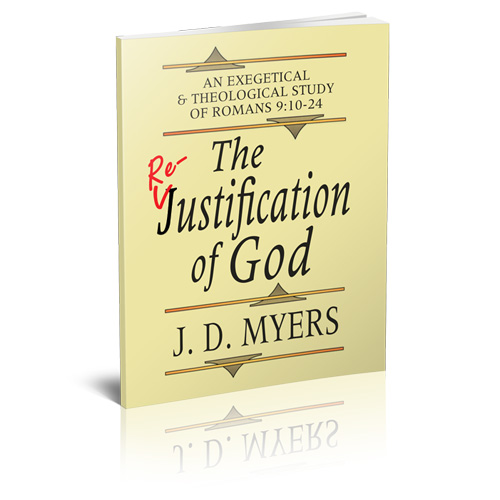
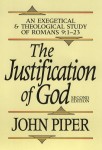 It is probably the ugliest book cover I have ever designed, but if you compare it with the cover from John Piper’s book on the right, you’ll see why I created the cover as I did.
It is probably the ugliest book cover I have ever designed, but if you compare it with the cover from John Piper’s book on the right, you’ll see why I created the cover as I did.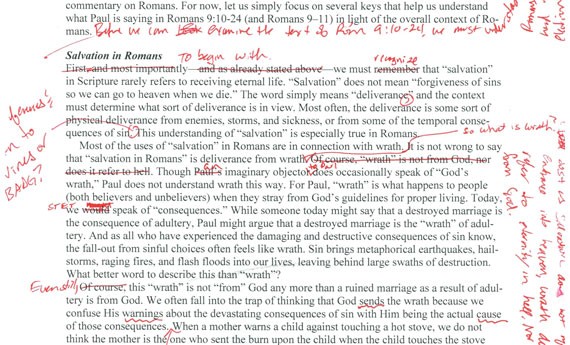
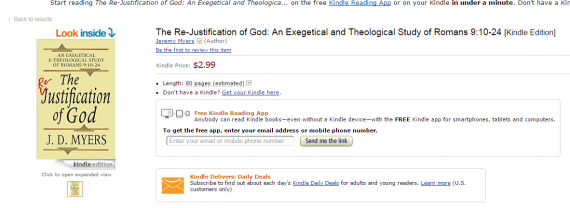




 Arthur Sido recently brought to my attention that in 2014,
Arthur Sido recently brought to my attention that in 2014, 
